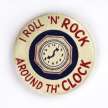Bill Graham: 'I Don't Pay for Limousines'
‘Fillmore East: The Venue That Changed Rock Music Forever’ Book Excerpt

I interviewed more than 90 of Fillmore East’s musicians and crew members, including 19 Rock and Roll Hall of Fame inductees, to write Fillmore East: The Venue That Changed Rock Music Forever. In a coming months I’ll release a few excerpts about the iconic New York concert hall.
Steppenwolf, fronted by singer John Kay, was a favorite of promoter Bill Graham, the mercurial impresario who brought Fillmore East to the East Village in 1968. The band’s success with hits like “Born to Be Wild” and “Magic Carpet Ride” quickly won them headliner status.
John Kay: We played for Bill at the Fillmore East four times. The first time we came through, we were still a baby band and we were the opening act on a triple bill: us opening, Quicksilver Messenger Service were in the middle, and the Electric Flag with Mike Bloomfield’s last performance in the band, were the headliners.
And then we subsequently had a higher profile as more successful records by the Wolf were released and we came back there several times more with artists such as Buddy Rich, which was a real interesting pairing.
Bill having come out from New York and having a theater background, I think he saw the opportunity of these kids, you give them a light show and you get a decent sound system in here and bring some music they can relate to, this works. And every so often, I could slip ‘em an act, there’s three acts a night, and they usually played twice each night, I can introduce them to some other things that they might have never heard of. Something from the South, or some East Coast act or whatever. And it just caught on.
I do know that he valued the artists and the music. I know that he brought people to San Francisco like B.B. King to play in front of a white audience. And Bill regularly would, I don’t want to say teacher, but he was like the music professor who would go out there on the stage and say, "Now I want you to know that you’re in for a treat because this man who’s about to take the stage is one of the icons of the blues . . ."
Bill had that very intense side to him. I remember one of our managers called one time and said, “You know, when you’re going to Fillmore East in two weeks, every time I talk to Bill, I battle with him over this thing, because your contract calls for two limousines: from the airport to the hotel and from the hotel to the gig. Everybody else, no problem. Bill says, ‘I don’t pay for limousines.’ Well, guess what. I managed to finally convince him. He said, ‘All right, fine.’ Maybe he just got tired of me browbeating him over this thing.”
It was a big deal to this manager of ours because he had managed to overcome Bill’s legendary combative negotiating style.
The limousines do arrive, we do play the weekend and a whole year goes by and we’re back in New York and I don’t think we were at the Fillmore East at that point. We said, the last time we were here we used that limousine company and they were good, let’s use them again. And the owner shows up with one of the limousines. This time I think we were on the hook because we were in town for something other than performing.
Anyway, he shows up and he goes to our road manager and says, “Oh man, I hate to bring this up but see this?” And he pulls out an invoice. He says, “I still haven’t been paid for last year.” I think Lance Corey was our manager. Lance said to him, “But that was Bill Graham’s dime, it was supposed to be. Didn’t you know that? Didn’t we say that?”
And he said, “Yeah, you told me. And when I didn’t get any payment, I went to see Bill.” The road manager said, “Well, what did Bill say?” And he said, “I never pay for limousines, that’s bullshit.” “They said it’s in the contract.”
Bill said, “They did? Let me check that.” He went over to a filing cabinet and pulled out the Steppenwolf contract and he flipped through the pages and says, “Christ, you’re right.” And he took a pen and he crossed it out and he said, “Well, it ain’t anymore, so get out!”
Fillmore East: The Venue That Changed Rock Music Forever is available on Amazon.

About the Creator
Frank Mastropolo
Frank Mastropolo is the author of Fillmore East: The Venue That Changed Rock Music Forever; Ghost Signs: Clues to Downtown New York's Past; and Ghost Signs 2: Clues to Uptown New York's Past, available May 2022.






Comments
There are no comments for this story
Be the first to respond and start the conversation.